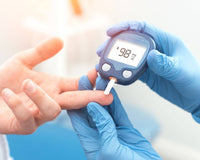Prednisone Brand Name, Dosage, Uses, Side Effects & Warnings
Prednisone is a prescription medication that can be used to raise levels of corticosteroids in the body. In doing so, it is able to help treat a variety of conditions including arthritis, multiple sclerosis, allergic reactions, and cancer. In the following short article we discuss prednisone brand name, and also the uses, dosage, side effects, warnings, and interactions of prednisone. Learn more about this medication that supports immune system health and reduces swelling.
Prednisone Brand Name
Prednisone is available as the brand name drugs Deltasone and Prednicot, with Deltasone being the more popular of the two.
What is Prednisone?
Prednisone is a corticosteroid medication used to conditions which cause low corticosteroid levels. These conditions include arthritis, severe allergic reactions, multiple sclerosis, and certain conditions that affect the lungs, blood, heart, liver, kidneys, and intestine. Prednisone can also be used to treat certain types of cancer.
Uses of Prednisone
Prednisone can be used to treat several conditions including skin disease, cancer, eye problems, immune system disorders, multiple sclerosis, severe allergic reactions, and arthritis.
It is especially helpful in reducing pain and inflammation associated with joint pain and immune system conditions.

How To Take Prednisone
Prednisone is available as an oral tablet, delayed-release tablet, and oral solution. It is usually taken with food between one and four times a day, depending on doctor recommendation. Your personal dosage schedule will depend on your condition and response to your first few doses.
If you are taking prednisone to treat a long-term disease, it is likely that prednisone will not completely cure your condition. Still, you should continue to take prednisone even if you feel well.
Do not stop taking prednisone without first talking to your doctor. If you suddenly stop taking prednisone, your body may not have enough natural steroids to function normally, resulting in negative symptoms such as extreme tiredness, weakness, slowed movements, upset stomach, and changes in skin color.
Call your doctor if you experience these or other unusual symptoms while you are taking decreasing doses of prednisone or after you stop taking the medication.
How Does Prednisone Work?
Prednisone works by inhibiting the immune system’s response to various diseases. This works to reduce swelling and other symptoms of allergic reactions. The immune system is your body’s defense mechanism against disease, injury, and infection. Prednisone can help lower symptoms brought on by the immune system, such as bruising and swelling.
Prednisone Dosage
Your dosage for prednisone may depend on many factors, including the following:
- Your age
- Your weight
- Strength of dosage
- Time between doses
- Severity of condition
Forms And Strengths
Concentrate: 5mg/mL
Oral Solution: 5mg/mL
Prednisone Dosage For Acute Asthma
Initial Dose: 40-60mg per day for 3-10 days.
Dosage For Glucocorticoid-Responsive Conditions
Initial Dose: 5-60 mg per day in a single dose.
Dosage For Rheumatoid Arthritis
Initial Dose: 10 mg per day added to disease-modifying antirheumatic drugs.
Prednisone Side Effects
Prednisone does have some associated side effects. Some side effects are more serious and less common than others.
Common Side Effects
Common side effects of prednisone may include the following:
- Headache
- Dizziness
- Difficulty sleeping
- Changes in mood
- Bulging eyes
- Acne
- Thin, fragile skin
- Red or purple blotches on skin
- Increased hair growth
- Extreme tiredness
- Weak muscles
- Heartburn
- Increased sweating
If these side effects are mild, they may disappear within a few days. If you have stopped taking your medication and the effects are still present, talk with your doctor or pharmacist.
Serious Side Effects
If you are experiencing any of the following serious side effects of prednisone, contact your doctor or pharmacist immediately. Call 911 if you think your symptoms are life threatening.
- Vision problems
- Eye pain
- Seizures
- Depression
- Confusion
- Muscle twitching
- Loss of contact with reality
- Shaking in the hands
- Upset stomach
- Vomiting
- Sudden weight gain
- Irregular heartbeat
- Rash
- Hives
- Itching
- Shortness of breath
- Swelling or pain in stomach
Disclaimer: Here at Manifest Pharmacy, our goal is to provide you with the most relevant and current information. However, because drugs affect each person differently, we cannot guarantee that this information includes all possible side effects. This information is not a substitute for medical advice. Always discuss possible side effects with a healthcare professional who knows your medical history.
What Are the Warnings of Prednisone?
Prednisone may slow growth and development in children. Always consult a doctor or pediatrician before your child takes prednisone.
Prednisone may increase the risk of developing osteoporosis. Talk to your doctor before taking prednisone if you believe you are at high risk for osteoporosis.
Some patients who have taken prednisone and other related medications have developed a form of cancer called Kaposi’s sarcoma. Talk to your doctor about the risks of taking prednisone.
Prednisone Interactions
Some products and medications that may interact with prednisone include aldesleukin, mifepristone, blood thinners such as dabigatran and warfarin, and NSAIDs. This medication can also interfere with certain laboratory tests, causing false results.
Prednisone And Alcohol
It is advisable that you avoid drinking alcohol while taking prednisone. Doing so can result in the following adverse side effects, among others:
- Bone weakness
- Immune system suppression
- Weight gain
How Long Does Prednisone Stay In Your System?
It take approximately 16-22 hours for prednisone to be completely removed from your system.
Prednisone Brand Name, Dosage, Uses, Side Effects & Warnings
Prednisone is a corticosteroid medication used to conditions associated with low corticosteroid levels, such as arthritis, severe allergic reactions, multiple sclerosis.
Prednisone is available as the brand name drugs Deltasone and Predictor. It comes as an oral solution and concentrates.
Prednisone works by inhibiting the immune system’s response to various diseases. In doing so, it helps to reduce symptoms of disease often exacerbated by the immune system.








